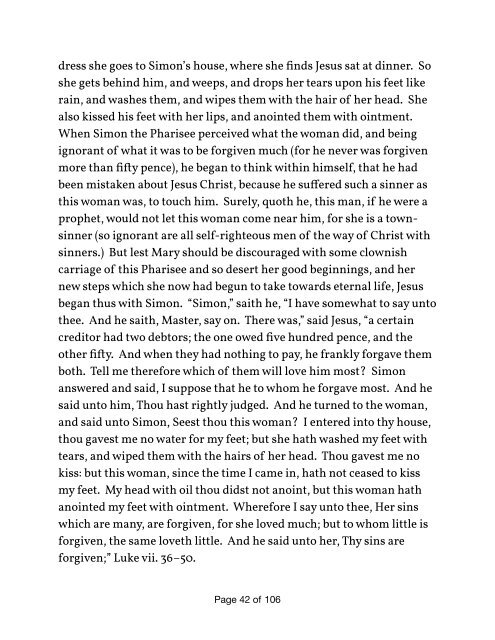The Jerusalem Sinner Saved; or Good News for the Vilest of Men by John Bunyan 1689
An encouraging book for those who feel guilty about their sins. It is a wonderful reminder that Christ's grace to his people knows no bounds and that his power to save even the worst sinner is not limited. "I have been vile myself, but I have obtained mercy; and I would have my companions in sin partake of mercy too: and therefore, I have writ this little book." Thus wrote John Bunyan about this unique gem. The premise of this book is that Jesus wanted his disciples to proclaim the gospel to the worst of sinners - those in Jerusalem who crucified their Messiah. To Bunyan's mind, this was the worst possible sin. The apostles were to begin there, with these worst of sinners, because, in Christ's eyes, they had the greatest need. Also, when they believed in Christ, his name would receive the greatest fame, and thus others would be encouraged to come to Christ. The kingdom of Satan would then be weakened, and the tempted and the weak would be helped. Further, the greatest sinners would love Christ the most when saved, and those who refused to repent would be left with no excuse. To Bunyan's way of thinking, this command to preach the gospel to "Jerusalem sinners" shows the gracious intentions of Christ toward men and his sufficiency to save the worst of sinners, and gives encouragement to those who think that their sin is too great to be forgiven.
An encouraging book for those who feel guilty about their sins. It is a wonderful reminder that Christ's grace to his people knows no bounds and that his power to save even the worst sinner is not limited.
"I have been vile myself, but I have obtained mercy; and I would have my companions in sin partake of mercy too: and therefore, I have writ this little book." Thus wrote John Bunyan about this unique gem.
The premise of this book is that Jesus wanted his disciples to proclaim the gospel to the worst of sinners - those in Jerusalem who crucified their Messiah. To Bunyan's mind, this was the worst possible sin. The apostles were to begin there, with these worst of sinners, because, in Christ's eyes, they had the greatest need. Also, when they believed in Christ, his name would receive the greatest fame, and thus others would be encouraged to come to Christ. The kingdom of Satan would then be weakened, and the tempted and the weak would be helped. Further, the greatest sinners would love Christ the most when saved, and those who refused to repent would be left with no excuse. To Bunyan's way of thinking, this command to preach the gospel to "Jerusalem sinners" shows the gracious intentions of Christ toward men and his sufficiency to save the worst of sinners, and gives encouragement to those who think that their sin is too great to be forgiven.
Create successful ePaper yourself
Turn your PDF publications into a flip-book with our unique Google optimized e-Paper software.
dress she goes to Simon’s house, where she finds Jesus sat at dinner. So<br />
she gets behind him, and weeps, and drops her tears upon his feet like<br />
rain, and washes <strong>the</strong>m, and wipes <strong>the</strong>m with <strong>the</strong> hair <strong>of</strong> her head. She<br />
also kissed his feet with her lips, and anointed <strong>the</strong>m with ointment.<br />
When Simon <strong>the</strong> Pharisee perceived what <strong>the</strong> woman did, and being<br />
ign<strong>or</strong>ant <strong>of</strong> what it was to be f<strong>or</strong>given much (f<strong>or</strong> he never was f<strong>or</strong>given<br />
m<strong>or</strong>e than fifty pence), he began to think within himself, that he had<br />
been mistaken about Jesus Christ, because he suffered such a sinner as<br />
this woman was, to touch him. Surely, quoth he, this man, if he were a<br />
prophet, would not let this woman come near him, f<strong>or</strong> she is a townsinner<br />
(so ign<strong>or</strong>ant are all self-righteous men <strong>of</strong> <strong>the</strong> way <strong>of</strong> Christ with<br />
sinners.) But lest Mary should be discouraged with some clownish<br />
carriage <strong>of</strong> this Pharisee and so desert her good beginnings, and her<br />
new steps which she now had begun to take towards eternal life, Jesus<br />
began thus with Simon. “Simon,” saith he, “I have somewhat to say unto<br />
<strong>the</strong>e. And he saith, Master, say on. <strong>The</strong>re was,” said Jesus, “a certain<br />
credit<strong>or</strong> had two debt<strong>or</strong>s; <strong>the</strong> one owed five hundred pence, and <strong>the</strong><br />
o<strong>the</strong>r fifty. And when <strong>the</strong>y had nothing to pay, he frankly f<strong>or</strong>gave <strong>the</strong>m<br />
both. Tell me <strong>the</strong>ref<strong>or</strong>e which <strong>of</strong> <strong>the</strong>m will love him most? Simon<br />
answered and said, I suppose that he to whom he f<strong>or</strong>gave most. And he<br />
said unto him, Thou hast rightly judged. And he turned to <strong>the</strong> woman,<br />
and said unto Simon, Seest thou this woman? I entered into thy house,<br />
thou gavest me no water f<strong>or</strong> my feet; but she hath washed my feet with<br />
tears, and wiped <strong>the</strong>m with <strong>the</strong> hairs <strong>of</strong> her head. Thou gavest me no<br />
kiss: but this woman, since <strong>the</strong> time I came in, hath not ceased to kiss<br />
my feet. My head with oil thou didst not anoint, but this woman hath<br />
anointed my feet with ointment. Wheref<strong>or</strong>e I say unto <strong>the</strong>e, Her sins<br />
which are many, are f<strong>or</strong>given, f<strong>or</strong> she loved much; but to whom little is<br />
f<strong>or</strong>given, <strong>the</strong> same loveth little. And he said unto her, Thy sins are<br />
f<strong>or</strong>given;” Luke vii. 36–50.<br />
Page<br />
42 <strong>of</strong> 106

















